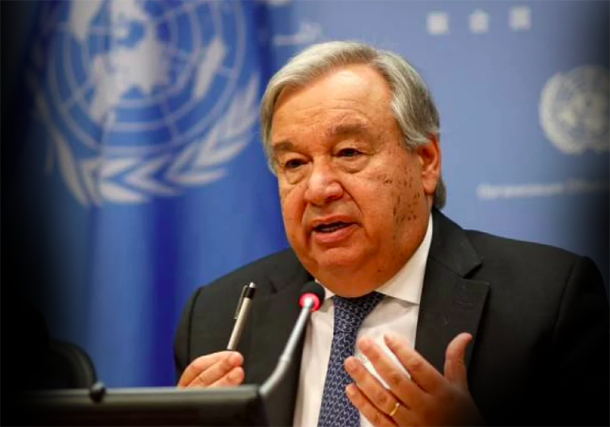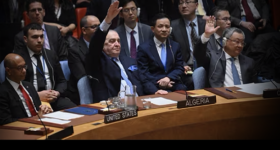
A statement by the Secretary-General of the United Nations, António Guterres, to the Global Food Security Call to Action ministerial meeting in New York City:
If We Don’t Feed People, We Feed Conflict, Secretary-General tells Global Food Security Call to Action Ministerial Event, Warning Mass Hunger Looms
Following are UN Secretary-General António Guterres’ remarks to the Global Food Security Call to Action ministerial meeting, in New York today:
Two weeks ago, I visited the Sahel region of Africa, where I met families who do not know where their next meal is coming from. Severe acute malnutrition — a wasting disease that can kill if left untreated — is rising. Farm animals are already dying of hunger. Leaders told me that, because of the war in Ukraine, on top of the other crises they face, they fear this dangerous situation could tip into catastrophe.
They are not alone. Global hunger levels are at a new high. In just two years, the number of severely food-insecure people has doubled, from 135 million pre-pandemic to 276 million today. More than half a million people are living in famine conditions — an increase of more than 500 per cent since 2016. As we will discuss in the Security Council tomorrow, these frightening figures are inextricably linked with conflict, as both cause and effect. If we do not feed people, we feed conflict.
The climate emergency is another driver of global hunger. Over the past decade, 1.7 billion people have been affected by extreme weather and climate‑related disasters. The economic shock caused by the COVID-19 pandemic has compounded food insecurity, reducing incomes and disrupting supply chains. An uneven recovery from the pandemic has already put many developing countries on the brink of debt default and restricted access to financial markets.
And now the Russian invasion in Ukraine is amplifying and accelerating all these factors — climate change, COVID-19 and inequality. It threatens to tip tens of millions of people over the edge into food insecurity, followed by malnutrition, mass hunger and famine, in a crisis that could last for years.
Between them, Ukraine and Russia produce almost a third of the world’s wheat and barley and half of its sunflower oil. Russia and Belarus are the world’s number two and three producers of potash, a key ingredient of fertilizer. In the past year, global food prices have risen by nearly one third, fertilizer by more than half, and oil prices by almost two thirds.
Most developing countries lack the fiscal space to cushion the blow of these huge increases. Many cannot borrow because markets are closed to them. Those that are able to borrow are charged high interest rates that put them at risk of debt distress and default. If high fertilizer prices continue, today’s crisis in grain and cooking oil could affect many other foods, including rice, impacting billions of people in Asia and the Americas.
High rates of hunger have a devastating impact on individuals, families and societies. Children may suffer the lifetime effects of stunting. Millions of women and children will become malnourished; girls will be pulled from school and forced to work or get married; and families will embark on dangerous journeys across continents, just to survive.
Ending hunger is within our reach. There is enough food in our world now for everyone, if we act together. But, unless we solve this problem today, we face the spectre of global food shortages in the coming months. I see five urgent steps for Governments, international financial institutions and others, to solve the short-term crisis and prevent long-term catastrophe.
First, we must urgently reduce the pressure on markets by increasing supplies of food and fertilizers. There should be no restrictions on exports, and surpluses must be made available to those most in need. But, let’s be clear: there is no effective solution to the food crisis without reintegrating Ukraine’s food production, as well as the food and fertilizer produced by Russia and Belarus, into world markets — despite the war. Russia must permit the safe and secure export of grain stored in Ukrainian ports. Alternative transportation routes can be explored — even if we know that by itself, they will not be enough to solve the problem.
Russian food and fertilizers must have unrestricted access to world markets without indirect impediments. I have been in intense contact on this issue with the Russian Federation, Ukraine, Turkey, United States, European Union and several other key countries. I am hopeful, but there is still a long way to go. The complex security, economic and financial implications require goodwill on all sides for a package deal to be reached. I will not go into details because public statements could undermine the chances of success.
Second, social protection systems need to cover everyone in need with the right combinations of food, cash and support for water, sanitation, nutrition, and livelihoods. Which in turn means, third: finance is essential. Developing countries must have access to liquidity so that they can provide social protection to everyone in need. International financial institutions need to step in with generous investments to prevent a global debt crisis. There is no answer to the food crisis without an answer to the finance crisis. Official development assistance (ODA) is more necessary than ever. Diverting it to other priorities is not an option while the world is on the brink of mass hunger.
Fourth, Governments must bolster agricultural production and invest in resilient food systems that protect smallholder food producers. At today’s prices, farmers cannot afford seeds, fuel and fertilizers. Governments must be able to support them with subsidies and connect them to markets.
Fifth, humanitarian operations must be fully funded to prevent famine and reduce hunger. Humanitarian organizations have a proven track record of preventing famine, most recently in South Sudan and Yemen. But, they need resources. And those resources must be used for maximum good, by exempting humanitarian food purchases from taxes, sanctions and other restrictions.
We are closely monitoring the global food security outlook and using our convening power to push for immediate steps. The Global Crisis Response Group on food, energy and finance is tackling the impact of the crisis on vulnerable people, identifying and pushing for solutions. The food crisis has no respect for borders, and no country can overcome it alone. Our only chance of lifting millions of people out of hunger is to act together, urgently and with solidarity.
– António Guterres, Secretary-General of the United Nations
ALSO JOIN OUR TELEGRAM CHANNEL
READ MORE UKRAINE NEWS AT: 21st Century Wire Ukraine Files
SUPPORT OUR INDEPENDENT MEDIA PLATFORM – BECOME A MEMBER @21WIRE.TV

Get Clive de Carle's Natural Health essentials of the finest quality, including vitamin & mineral supplements here.















